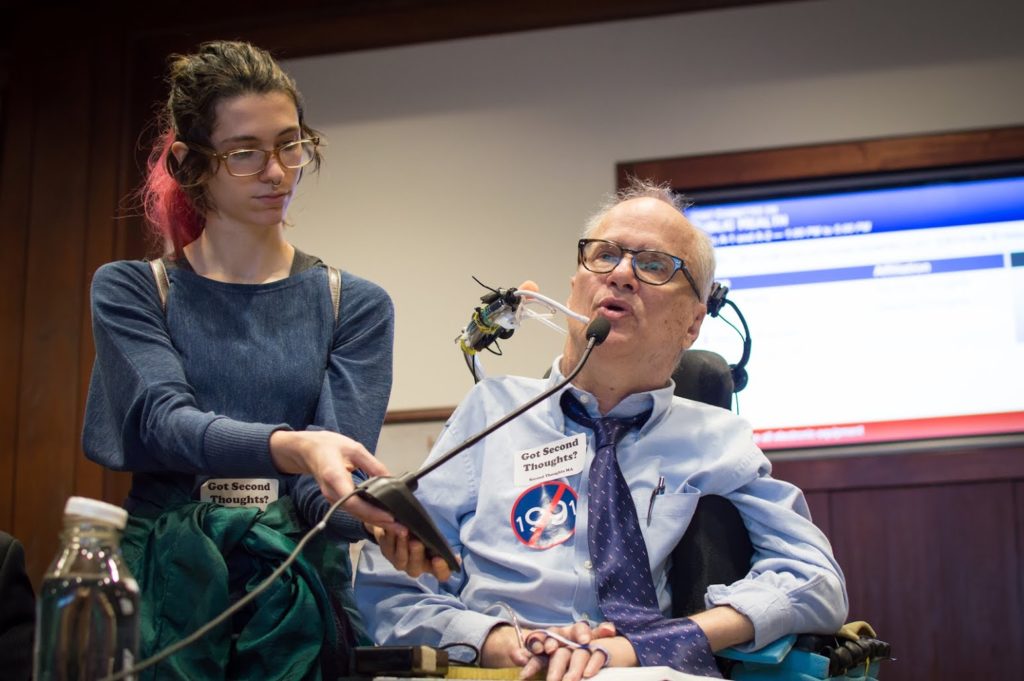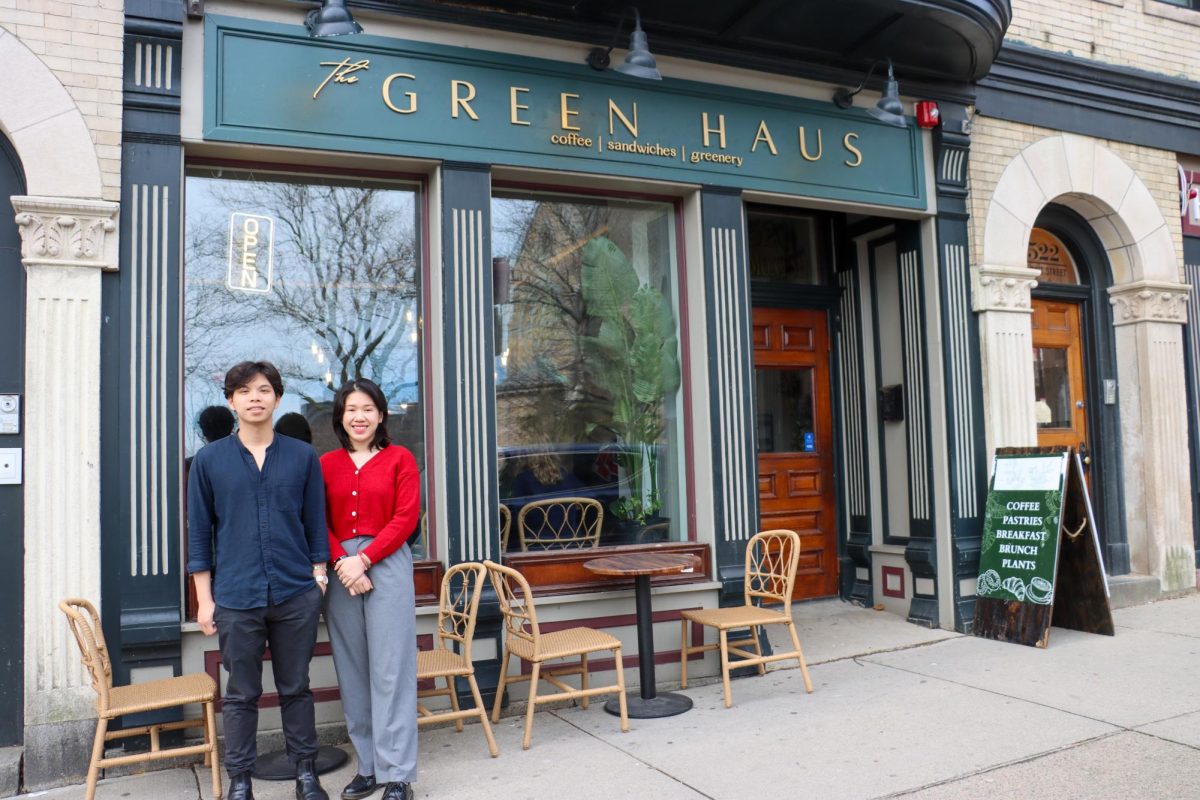By Rowan Walrath, managing editor
Massachusetts legislators are considering joining five other states in legalizing aid in dying, also known as physician-assisted suicide. Last week, lawmakers on Beacon Hill hosted a hearing regarding H1991, a bill that would permit the practice statewide.
This is the fourth time that Rep. Louis Kafka, D-Stoughton, has introduced the bill in the House. Kafka has filed an assisted suicide bill for three sessions at the request of a constituent who had terminal stomach cancer and has since died.
“[H1991 is] a bill that will, if passed, if signed into law, give those people who meet the criteria the ability to request medication that will end their life as they see fit,” Kafka said.
According to Kafka, to meet these criteria, a person has to be diagnosed with a terminal illness that will cause death within six months and be of sound mind to make the decision to request aid in dying. In Oregon, Washington, Vermont and California the practice is legal by state law; in Montana, court opinions have said the state cannot prohibit it. A New Mexico county court briefly held a similar view before being overruled by the state’s highest judiciary.
Thirty-nine legislators co-sponsor the bill. Senate President Stan Rosenberg, D-Amherst, while not allowed to co-sponsor it, is in support of it as well. Rosenberg advocates for physician-assisted suicide, as long as it incorporates lessons from other states and is done correctly.
“He said last week that he hasn’t discussed it in the Senate with his colleagues, but, personally, he feels that he could find some common ground, that we could move forward on it,” Pete Wilson, a spokesperson for Rosenberg, said.
Three years ago, Massachusetts voters narrowly defeated a proposal to legalize aid in dying, 51 to 49 percent. Nationally, 70 percent of respondents to a 2014 Gallup poll said doctors should be allowed to end a terminally ill patient’s life “by some painless means,” though support sharply fell to 51 percent when the phrase “assisted suicide” was used.
Second Thoughts Massachusetts, a disability rights advocacy group that opposes aid in dying, stands against the bill.
“It violates the core tenets of public health policy,” founder John Kelly said. “Abuse is impossible to prevent, and the harm, wrongful death, is impossible to reverse.”
According to Kelly, because misdiagnosis is rampant, one of the key criteria to request aid in dying – having a terminal illness with a six-month prognosis – is too vague. A CBS report last year found that 12 million American annually are misdiagnosed.
Additionally, there are several cases of abuse of aid in dying. The Disability Rights Education and Defense Fund (DREDF) cites several of these cases, including one that Kelly mentioned specifically: the case of Wendy Melcher.
Melcher, who had neck and throat cancer, died in August of 2005 after two Oregon nurses, Rebecca Cain and Diana Corson, gave her overdoses of morphine and phenobarbital, according to the DREDF. The nurses claimed Melcher requested aid in dying, but they administered the drugs without her physician’s knowledge, violating Oregon’s Death with Dignity Act. Kelly said that at least one of these nurses is still practicing today, as no criminal charges were pressed.
Compassion and Choices is an organization that supports aid-in-dying bills around the country. Marie Manis, campaign manager for the group’s Massachusetts wing, said Kelly’s and others’ fears are “really unfounded.”
The organization’s goal is to help people toward the end of their lives, according to Manis. Compassion and Choices has a national end-of-life counseling and resource center that’s available to anyone across the nation. The organization also has a legal arm.
Manis objected to the use of the term “assisted suicide,” making a distinction between suicide and aid in dying.
“Suicide is when one cuts a life short, and these people are actually dying from their disease,” Manis said. “All this is, is giving them a way to go that is comfortable and peaceful.”
However, Kelly disagreed.
“We say that we should have equal suicide prevention services,” Kelly said. “We find the bills very dangerous and, rather than making sure everyone has in-home support they need and counseling and whatever would make their life better, we’re going directly to suicide as the solution. And when there is so much inequality in our society, to talk about suicide as a solution to [disability] is really a problem.”
According to Kelly, the people who oppose aid in dying are those who are economically disadvantaged, people of color and disabled people. These are people who already have difficulty accessing medical care.
“Disabled people are often given the message that it would be better for us and for people around us if we were to die… It’s really bad public policy,” Kelly, who is paralyzed below the shoulders, said. “Let’s not promote suicide.”
Northeastern students had varying opinions on aid in dying as a concept.
“I’m totally for it after serious psychiatric inquiry to make sure they’re of valid mind,” Chris Silva, a junior graphic design major, said. “Something where the alternative to physician-assisted suicide is essentially wasting away painfully.”
Laura Stiers, a third-year economics and environmental studies major, felt that there was a conflict between the personal and the political.
“I think it should be a personal decision,” Stiers said. “I’m not sure about a government decision.”
As far as Massachusetts goes, the bill is still being discussed. The Joint Committee on Public Health is still analyzing the testimony and has not determined what will happen next with H1991.
At last week’s hearing, the Massachusetts Medical Society voiced strong opposition to the bill. According to the society, quoting the AMA’s Code of Medical Ethics, physician-assisted suicide is fundamentally incompatible with the physician’s role as healer.
“What is very clear to all is that there needs to be great compassion for our patients who suffer from terminal and debilitating diseases,” the Society’s testimony read.
Peter Korchnak is the digital communications manager at the Death With Dignity National Center, which supports aid-in-dying bills around the country. He does not believe the bill will be signed into law this session.
“Though we remain hopeful, we don’t see enough political will in the legislature to pass the bill,” Korchnak said in an email to The News. “Whereas the national movement is toward passing Death with Dignity laws in state legislatures, we believe a ballot initiative may be a more likely route in Massachusetts, though the issue can’t return to the ballot in the Bay State until 2018.”
Photo by Michelle Lim
Correction: A previous version of this story claimed that Senate President Stan Rosenberg was a co-sponsor of H1991. Because senate presidents are not allowed to co-sponsor bills, this has been updated to reflect accurate information.














